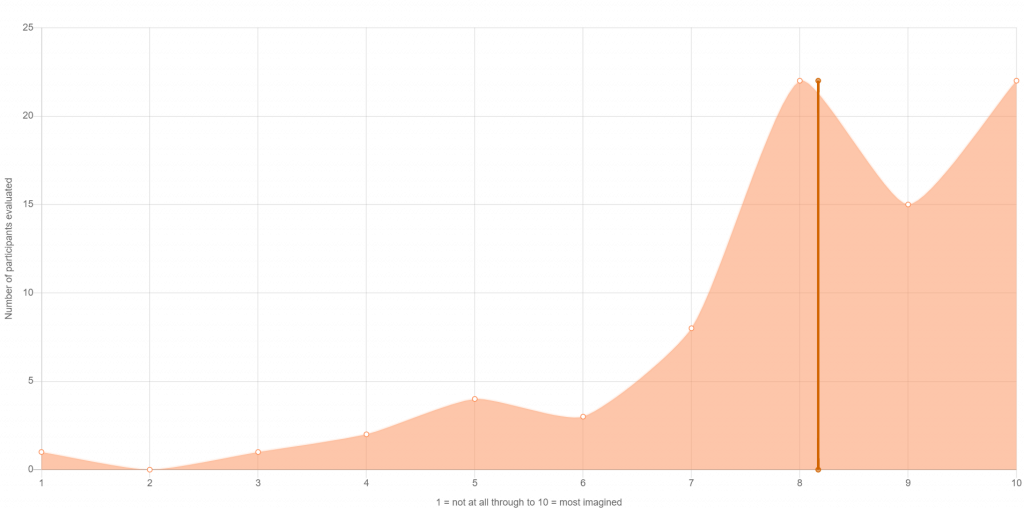Objective: Feeling valued to be experienced
Outcome: Feeling valued is experienced
Measure: Feeling valued experienced
Short description
By ‘feeling valued experienced’, we mean a sense of self-esteem or worth that comes when an individual or their achievements are recognised or admired by someone who is important to them and whose opinion matters to them.
Full description and underpinning theory
Full description
This outcome is about the sense of self-esteem or worth that occurs when an individual’s knowledge, practice and achievements are respected or admired (recognised) by someone who is important to them and whose opinion matters to them (valued other). This might include family members or other loved ones, teachers, mentors, leaders or other people in the community (both within and outside of any specific community of interest), including those who might have expertise related to the activity undertaken.
Theory underpinning this outcome
Being seen and valued as a human being is essential to all people. According Maslow’s hierarchy of needs, humans need to feel love (sexual/nonsexual) and acceptance from social groups (family, peer groups). All humans have a need to feel respected, and be accepted and valued by others. People often engage in a profession or hobby to gain recognition. Maslow noted two versions of esteem needs: the “lower” version of esteem is the need for respect from others. This may include a need for status, recognition, fame, prestige, and attention.The “higher” version manifests itself as the need for self-respect. For example, the person may have a need for strength, competence, mastery, self-confidence, independence, and freedom. This “higher” version takes precedence over the “lower” version because it relies on an inner competence established through experience. Deprivation of these needs may lead to an inferiority complex, weakness, and helplessness. (Maslow, 1943).
The absolute dignity or basic humanity that all humans share is maintained and promoted when a person is recognized by others (Edlund, 2002; Nordenfelt, 2004). ‘Social dignity’ (Jacobson, 2007) is used to explain the reflection or mirrored image of absolute dignity, as a person’s humanity depends on, is created by and is upheld in social settings. An individual’s dignity depends on being able to recognize humanity in others and having one’s own humanity recognized by others. To recognize means to see once more, to accept, to distinguish, to acknowledge, to understand and to strengthen (Schibbye, 2009). Thus, humanity implies vulnerability as we depend on others for recognition ( Eriksen, K. 2012, p. 358).
Research shows that one of the factors that promote positive social development is recognition for effort. All children need…recognition for their efforts, improvements, and accomplishments. When young people are provided with opportunities, skills, and recognition, they develop strong social bonds, that is connections with and commitment to the families, schools, and communities that provided them (Catalano & Hawkins, 1996).
Evidence that this outcome occurs
A recent literature review found that arts activities were successful in improving self-confidence and self-esteem in children and young people. Feeling valued as a result of the arts engagement was commonly cited as a factor in the improved sense of confidence. (Zarobe and Bunday, 2017)
Activities contributing to this outcome
Activities
As of April 2021, there were 28 activities in Takso selecting this outcome with 4 completed and evaluated. Types of activities undertaken to achieve this outcome include:
- Creative community,
- Performances: performing arts of all forms,
- Professional development.
Results
Over the 4 completed activities that addressed this outcome, 78 people responded to the evaluation question. On a scale of 1 to 10, with 1 being not at all and 10 the most imaginable, respondents reported an average attainment of 8.2 for this outcome.
Feeling valued experienced
4 activities / 78 responses / Average attainment 8.2

Evaluation measure
Recognition from valued other/s received
References
Zarobe, L and Bungay, H. (2017) The role of arts activities in developing resilience and mental wellbeing in children and young people a rapid review of the literature. Perspectives in public health. 137(6): 337-347
(This section is currently in development. Updates will be posted here as they are completed.)

